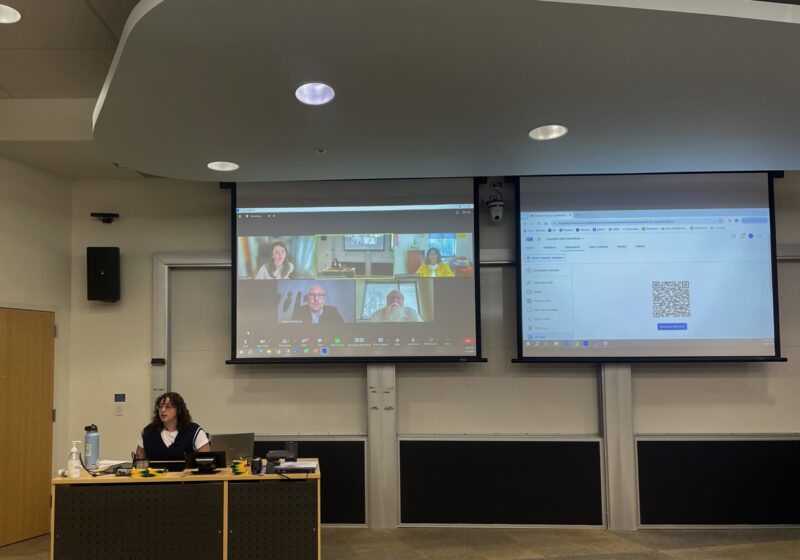He was wearing a checkered, button-down shirt and a grin.
“Want a story?” he asked as I walked up to him at the National Museum of Play at the Strong.
“Of course!” I replied. I gave him my prompt: something about a bird lost in the city of Rochester. He asked what the bird’s name was. Like a good Rochesterian, I replied, “Meliora.”
And that was it. He sat down, typewriter atop a book on molecular biology on his lap, and wrote.
Karl Smith is a fourth-year Ph.D candidate in Biophysics at the University, working on nanoporous silicon membranes—a filtering technology. He’s also a storyteller. And, according to him, he has been for a long time.
“I worked as a historical interpreter at a boy scout camp in New Mexico,” he said. “I would tell these dramatic stories that weren’t supposed to scare you or make you laugh. They were supposed to make you feel something—a sense of wonder! I was really good at it.”
Arriving at Rochester, he wanted to keep this creative side of himself alive.
“There’s a space for storytelling in science, but not when you’re a brand new grad student,” he quipped. “I believe very strongly in making the world a more whimsical place.”
That’s what Smith does—not only with the content of his short stories, but also with the setup itself. He has a chalkboard labeled “10-cent stories,” a chair, a typewriter and a molecular biology textbook to prop it on. He sets up around Rochester: Ontario Beach Park’s Pier, the Corn Hill Arts Festival, the Rochester Public Market and, most recently, the Strong Museum of Play.
“Until the first person comes up, you’re just sitting there,” he said. But when the first person does, things change. “I don’t know what it is about the setup, but [people] feel like they can really open up to me. Sometimes it’s wonderful, sometimes it’s perplexing and sometimes it’s downright frightening.”
Over the last two years, Karl has written over 400 stories—last Friday at the Strong Museum, he wrote 35—so he certainly has a collection of the wonderful, the perplexing and the frightening.
Karl finishes my story and rips the page from the typewriter, giving the bottom edge a playfully ragged look. And just in time, too, as other museum-goers approached.
A gaggle of pre-schoolers wearing too-large orange jerseys is shepherded over. In response to their shouts of prompts and characters, Karl writes a story about a “cookie man” that falls on top of Humpty Dumpty, breaks him and has to figure out how to put him back together. The inversion of the classic Humpty Dumpty story—that Humpty Dumpty doesn’t fall, but rather is fallen on—is lost on them. He finishes the story, and reads it to them with characteristic energy and enthusiasm. Later, a freckled blond girl gets a story—a “fairy tale about Santa Claus’s elves.” She’s surprised that he keeps prompting her with more questions to set the framework of the story.
Earlier, Karl had explained to me, “It feels like we do something together.” I saw that happening. Karl writes, bringing the story together—but there’s buy-in and creativity on the part of the “client,” as well. He invites them to join in the whimsy.
“Do you want to know why they’re 10-cent stories?” Karl asked. I did. According to Karl’s uncle, “a penny’s too small, a quarter’s too heavy. The thing you want to collect is dimes. I guess they’re small relative to their worth.”
The same can be said of Karl’s stories: they’re small relative to their worth. The stories are short and sweet, rather silly and marked up with the inevitable errors of writing with a typewriter, but they’re worth something more. They’re worth a chance encounter with a guy in a checked shirt, a typewriter,and some creativity.




